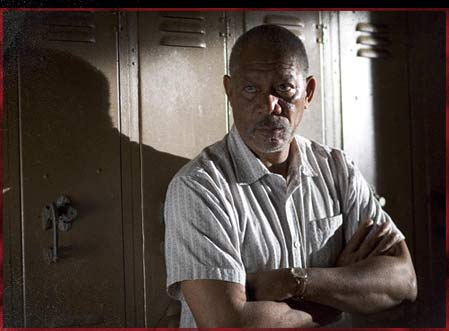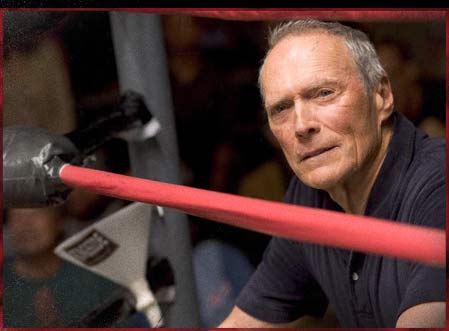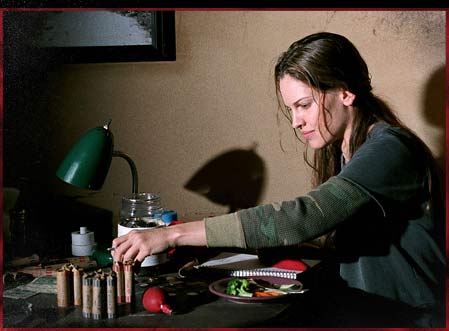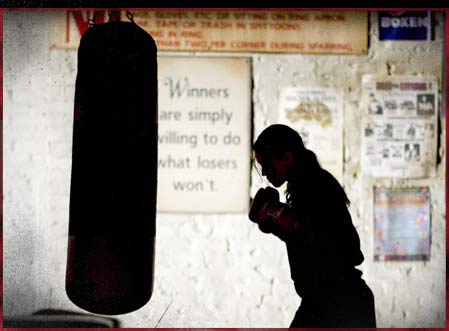Journal of Theatrical
Combatives Sept 2005
Maggie in me - Million Dollar Baby and the meaning of martial arts
practice
Deborah Klens-Bigman, Ph.D.
On the plane going to Tokyo this summer, trapped by a 13-hour flight, I
was intrigued to see that JAL featured Clint Eastwood’s Million Dollar
Baby as part of its in-flight entertainment. I had wanted to see
it, but, as usual, had not managed to make the time. I knew about
the end-of-life controversy in the story, knew about Hillary Swank's
training regimen. Moreover the coincidence of the Terry Shaivo
case coming about and reaching crisis level in the US after the movie's
release provided it with (forgive me) a priceless, if unexpected,
publicity boost. Pundits and advocates for the disabled made
arguments; Eastwood and his cast wisely kept mum. So much had
been written and said about the film, it was almost (I thought) as
though I had already seen it, when I had not.
I should point out that I am something of an Eastwood fan. Not so
much of the guy himself in a way, but the movies. Once considered
schlock, films like The Good, The Bad and The Ugly are now considered
classics of a film genre, the Western, that is all but dead.
While I never felt much interest in Eastwood's acting ability, I have
enjoyed watching his face age from the homoerotic attractiveness of the
TV series Rawhide to the weather beaten elegance of Pale Rider.
So, I wanted to see the Million Dollar Baby, but in some ways felt it
was almost beside the point. However, there I was with 13 hours
and not much to do, so what the hell. Might was well go to the
movies.
I don't know many women who like boxing or wrestling, but I actually
do. When I was in junior high, I went to wrestling matches
(Greco-Roman style, not professional style) by myself because I could
not get anyone to go with me. I enjoyed watching each wrestler as
he left his teammates on the bench and went forth alone to meet his
adversary. Once he was out on the mat, no one could tell him what
to do. He would win or lose by himself.
I probably would have gone to boxing matches if there were any, but
there weren't (and I somehow think my parents would have drawn the line
there, anyway). I had to content myself with televised
matches. I remember sitting with my uncle watching Muhammad Ali
in the'70's, while everyone else either left the room or
complained.
My interest in boxing held true at least until something like maturity
took over. The inherent violence in people trying to destroy each
other’s faces, albeit under certain rules, has started to bother
me. I now think people should wear head protection.
Muhammad Ali has Parkinson's. Another uncle of mine (not the
boxing fan) died of Parkinson's. There you are.
Some comment has been made of the brutality of the boxing scenes in the
Million Dollar Baby. Most video I've seen of women's boxing has
the opponents wearing head protection. Eastwood has his fighters
duking it out without it, which is a little startling. In a way,
though, it's like taking off the training wheels. The opponents
are consenting adults who seem to have their brains more or less intact
(at least to begin with).
The film opens with Eastwood's character, Frankie Dunn, a trainer and
sometime manager, holding back a fighter from a championship
bout. Frustrated, the boxer changes to a different manager and
gets, and wins, the title bout. That's how stuff goes for
Frankie. He's his own worst enemy when it comes to success.
His friend, employee and conscience, Eddie "Scrap Iron" DuPris (Morgan
Freeman) seems to have more business savvy (why his job consists of
cleaning toilets is never really explained).

In these scenes, Eastwood's Frankie is a hard-bitten type. The
sometimes stark lighting shows every well-earned crag on his on his
aging face.
Enter Maggie Fitzgerald, a product of a white trash background who
moves to the big city. She works as a waitress but is so bad at
it she has to swipe food off customers' plates to make up for her lack
of tips. She finds Frankie's gym and trains late into the night,
even though Frankie ignores her, stressing to everyone who will listen
that "I don't train girls," and that her age, at 30, makes her too old
to be a contender.
The other boxers make fun of her, along with a stringy kid with a big
heart, a big mouth and no talent whatsoever. Throughout the film,
Eastwood contrasts these characters with each other. More than
just comic relief, this character, alternately nicknamed "Danger" or
"Flipper" depending on who is speaking, offers a contrast to how men
view a "lovable loser" type with a woman in a male-dominated
sport. At first, their treatment is nearly identical. After
Maggie gets through a few rounds of verbal sparring, however, they
simply ignore her.
Maggie has no reason to keep going. The other boxers threaten
her, Frankie ignores her. Only Scrap, who lives at the gym and
sees her training into the night, begins to see her potential and gives
her a few pointers, more than enough to keep her going.
We pretty much know the rest of the story. Maggie becomes
successful by knocking out one opponent after another. Despite
Frankie's entreaties that she develop some strategies that would
prolong fights and make her more marketable, she continues to do it her
way, earning fans by developing an Irish persona based on Frankie's
study of Gaelic and her own stubborn character.
Maggie's success does not sit well with her po' white family,
however. She buys a house for her mother with cash, only to be
told by the ingrate that her welfare benefits would be cut if she
accepted it. Cranking up the mortification, Maggie's mother
further tells her that people think what she is doing, making a living
as a boxer, is odd and freakish. Sophisticates may laugh at the
rube portrayal, but I grew up in Appalachia (enough said). It is
a brutal characterization in what is, sometimes, a brutal film.
Maggie finally makes it to her title shot. Her opponent is "Blue
Bear," a former East German prostitute who bends and breaks the rules,
but, as Freeman's narration notes, "the crowds loved her." Though
I can see the need for this character to provide the impetus for the
tragic ending of Eastwood's vision, it is hard to justify what happens
next. Perhaps after holding back another potential champion,
Frankie is determined not to make the same mistake again. Fine,
but why is Maggie so woefully unprepared for this particular opponent,
especially after seeing a video tape and no doubt knowing her
reputation? Though the climactic battle is exciting, it is, in
retrospect, a weak point in the film.
When Maggie suffers a traumatic spinal injury as a result of Blue
Bear's treachery in the ring, the ending of the film is somewhat
inevitable, even though Eastwood devotes about 1/2 hour to it.
Maggie's family crawls out from under their rock to visit her at the
rehab center. After spending a few days as tourists, they finally
show up in order to get her to sign over her assets to them.
Finally, Maggie finds her spine (though it is injured) and refuses
their request. Bedridden as she is, she has enough force of
personality to back them off and make them leave her alone.
Maggie's ordeal wears down Frankie. (It seems to wear down Swank,
too. Her physical transition from buff fighter to rail-thin
invalid is shockingly, and cleverly, revealed). This is the best
part of Eastwood's performance. The craggy, determined face
literally sinks during the last half hour of the film. It is
almost like the end of the film becomes a duel between Swank's brutally
honest performance and That Face.
Most of us know the film's ending (especially since the video came out
recently), so I won't elaborate, since it is not part of my larger
argument, which is coming soon, I promise.
So, here we have a film that in many ways could be said to be rank with
cliché. The scrappy "girl" and the cratered veteran, the
wise old black dude and the hapless kid. They ignore her.
She wins them over. She becomes too successful for her own
good.
The day after I arrived in Japan, I managed to drag myself to the dojo
where I train in Tokyo. I suffer pretty badly from jetlag,
especially on the first day, and, until I actually showed up there, I
wasn't sure I was going at all (I even got lost on the way to the
station, a trip I've made many times). I didn't even bring my
keikogi, figuring I'd just show my face and then wander off somewhere,
still trying to adapt to the day and time shift. No way. My
teacher looked me over, and when he found out my gi was still packed in
my luggage, said, "Here, wear one of mine." So, comically
outfitted in a gi and hakama that were too large for me, I proceeded to
have my butt kicked for two hours.
It was the rainy season, but the dojo air conditioning was not
on. Pretty soon I was soaking my borrowed duds, my scent mixing
with my teacher's. He kept correcting, correcting and I kept
working, working. Do it again. No, again. No again,
again.
Then it hit me, how much my story in martial arts is like Maggie
Fitzgerald's story in Million Dollar Baby, though, hopefully, with a
better outcome.
When I started at the dojo, almost 20 years ago, the reaction of my
sempai (all guys) was a mixture of curiosity and a sense of
something not being quite right. I think there is a sense of
skepticism in iaido dojo about new students anyway. People are
reluctant to accept newcomers because they often don't stick
around. More true for women who face, I think, more opposition
generally when they take up a martial art, and have seemingly many more
demands on their free time, whether by choice or otherwise.
So, my new-found colleagues, when they took me out for a beer my first
week, were nonplussed when my answer to their question as to why I was
there was that it was my 30th birthday present to myself.
As time wore on, I was ignored and shunned from time to time.
Parties and events took place without me hearing about them until
afterward. One guy told me flatly that "women don't traditionally
study long sword." After four months I was ready to quit, to find
something more welcoming, or easier to get into, or to simply go back
to the fencing salle I came from. But I didn't.
I didn't quit for a number of reasons, but the most important one was
that I had a mentor, like Maggie. The instructor at the time
refused to give up on me; in fact, he pushed me to be better, told me I
had to be better than the guys. He pushed and corrected and
advised. As a black guy, I think he sympathized with the fact
that I was not readily accepted, realized my determination, and kept
hooking my desire to do better. It was not that he recognized my
potential as a martial artist; to this day stubbornness is my best
asset when it comes to this stuff. I consider myself – like
Maggie – to have minimal talent. I just practice a lot – as much
as my schedule will allow.
The other reason I did not quit was Otani Sensei. At that point,
he only came in to the dojo once or twice a month, but he always had a
kind word. I found out later that Sensei had three daughters, but
no sons. He also saw no reason I could not do well, and he told
me so every time I saw him.
Since they didn't give up, I didn't give up. Eventually, I
endured everything, including a period of a year or so after my
instructor-mentor left and no one would teach me anything new. I
learned to correct myself, and teach myself. To annoy people by
asking questions, and to push into the areas of the style that I didn’t
fully understand in order to learn them better.
At the end of the Million Dollar Baby, Frankie berates himself for
Maggie's fate. Scrap tells him that people go through their whole
lives without ever getting a shot at a title. In spite of the sad
outcome, Frankie had allowed Maggie to "take her shot."
We have had a small trickle of women who have come through our dojo in
the 19-plus years I have been there. One has now stayed for a
short time, while the rest have come and gone. While I am
comfortable being in the instructor’s role, I am not comfortable being
a mentor; I know from watching some of the senior students and Otani
Sensei that mentoring has its downside of disappointment.
Sometimes the chosen student does not want to live up to the
expectations of the mentor; sometimes the mentor's demands are too
steep, and sometimes the student is honestly not worthy of the
attention. The best I can do as an instructor is guarantee that
people who come to our dojo get their shot if they work for it.
At least they can all get that.
Million Dollar Baby, 2004 Warner Bros. Pictures, Directed by Clint
Eastwood. Available from Warner Home video, Burbank, CA, USA.
Photos courtesy Warner Brothers.
Our
Sponsor, SDKsupplies




